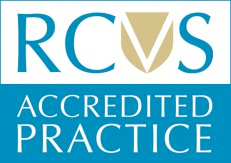Welcoming your New Puppy
Vaccinations
Vaccinations are an important routine procedure carried out every year for your companions. Puppies can start their routine vaccinations from 8 weeks of age this is repeated 4 weeks later. In the UK these vaccinations cover, Distemper, Hepatitis, Parainfluenza, Parvovirus and Leptospirosis. It is important to keep in mind that vaccinations, unfortunately do not stop your companion from being unwell.
Kennel Cough (a highly contagious disease of the respiratory tract): This vaccination is available alongside routine vaccinations and for puppies from 12 weeks of age. The vaccine isn’t routinely needed, but Kennels require dogs to have this vaccine at least 2 weeks before admittance. Even though this vaccine isn’t normally required, the virus can be transmitted through the air, this means close contact with any other dogs carrying the bacteria/virus, sharing bowls with other dogs or even on blades of long grass in a field.

Register with us
Microchipping
It is now a legal requirement for dogs to be microchipped before 8 weeks of age. A Microchip is a very small electronic implant that is inserted underneath your pet’s skin. It holds a unique serial number which when looked up on a national database, stores your (the owners) contacts details, so that if your pet is lost or stolen, they can be reunited with you swiftly and safely. WE URGE YOU TO MAKE SURE THAT ALL OF YOUR DETAILS ARE CONSTANTLY KEPT UP TO DATE! You can make sure of this by asking your vet practice to give you the manufacturers details!
Kennel Cough (a highly contagious disease of the respiratory tract): This vaccination is available alongside routine vaccinations and for puppies from 12 weeks of age. The vaccine isn’t routinely needed, but Kennels require dogs to have this vaccine at least 2 weeks before admittance. Even though this vaccine isn’t normally required, the virus can be transmitted through the air, this means close contact with any other dogs carrying the bacteria/virus, sharing bowls with other dogs or even on blades of long grass in a field.
Worming
Worming is important for prevention of a build-up of worms including, roundworm, tapeworm and lungworm. Round worm and some type of tape worm can be passed onto people which may cause disease or even blindness so this is very important if you have younger family in the home.
Young puppies need to be wormed at 2, 5 and 8 weeks of age. Then they are wormed every 4 weeks until they are 6 months of age. From 6 months we advise that 3 monthly worming is required from then on.
Flea & Tick Treatment
Fleas can be very problematic so treating your puppy for them as soon as possible, as they can lay up to 2000 eggs each!
Flea treatment can be applied from 6 weeks of age. The treatments can be in a spot-on form and a tablet. There are several products that can be used, a quick conversation with your Vet or Veterinary Nurse can help you choose the best product for your companion.
Ticks we would recommend a regular tick treatment in our area, ticks can attach to humans and dogs, they can spread disease to both species.
Dental Health Care
Dental health care is something that owners are not so aware of. Just like us, dental check-ups are important for dogs to check for build-up of tartar or plaque which can lead to other more serious problems.
Puppies start off with baby teeth, these will fall out between 12 to 18 weeks of age. At 6-month puppy checks this is something we routinely check to make sure that there aren’t any baby teeth left to fall out, these are called deciduous teeth.
We would recommend that once Puppies adult teeth are fully through then brushing their teeth once daily with a doggy tooth brush or toddler’s toothbrush with enzymatic toothpaste is Gold Standard! Other dental products can be discussed with a Veterinary Nurse.
Neutering
Spaying – Females
Castration – Males
Castration can be carried out from 6 months of age. Larger breeds can be done at a later stage, between 9-12months. If you would like to discuss when is the best time to neuter your dog please speak to one of our Vets or Vet Nurses.
Spaying females can provide benefits such as, unwanted pregnancies, prevention of mammary cancer or a Pyometra (which is a serious womb infection), later in life. Castration of males can prevent testicular and prostate disease, prevent roaming and unwanted scent marking. A bitch can be spayed pre puberty at 6 months before the season or 3 months after the end of their first season. Please discuss at the 6-month puppy check what is best for your dog.
See also:
Pet Health Insurance
Pet Insurance is always recommended as often in emergency situations or if continuous medications are needed this can help with covering costs. It is beneficial to sign up to an insurance when your pet is young.
There are many policies available but we advise to look for a LIFETIME policy. This type of policy is more likely to cover you for most illnesses or injuries although exclusions can apply. Top tip: READ THE SMALL PRINT!
Socialising
It is very important your new puppy is socialised with as many people, children, people with hats sunglasses, play dressing up games! People come in all shapes and sizes and wear different things. Noises, surfaces, other dogs and animals are all a learning curve. Dogs should never be allowed off lead in fields with livestock and all faeces should be picked up. Before fully vaccinated your puppy should not socialise in places where other dogs have been. They can be in your arms. Take for a short walk in your arms to see some quiet traffic and build up to busier situations. There are lots of useful tips on websites this is one https://www.bluecross.org.uk/pet-advice/socialising-your-puppy
Finding a good puppy class for training and controlled socialisation is a good idea once your puppy is fully vaccinated.
In an Emergency
Here at North Park, we have a 24hr Emergency contact with our vets specifically for your emergency needs. Calling 01837 82327 out of surgery hours will take you through to our emergency answering service who will take down your details and a vet will get back to you as soon as possible.
Finding a good puppy class for training and controlled socialisation is a good idea once your puppy is fully vaccinated.


